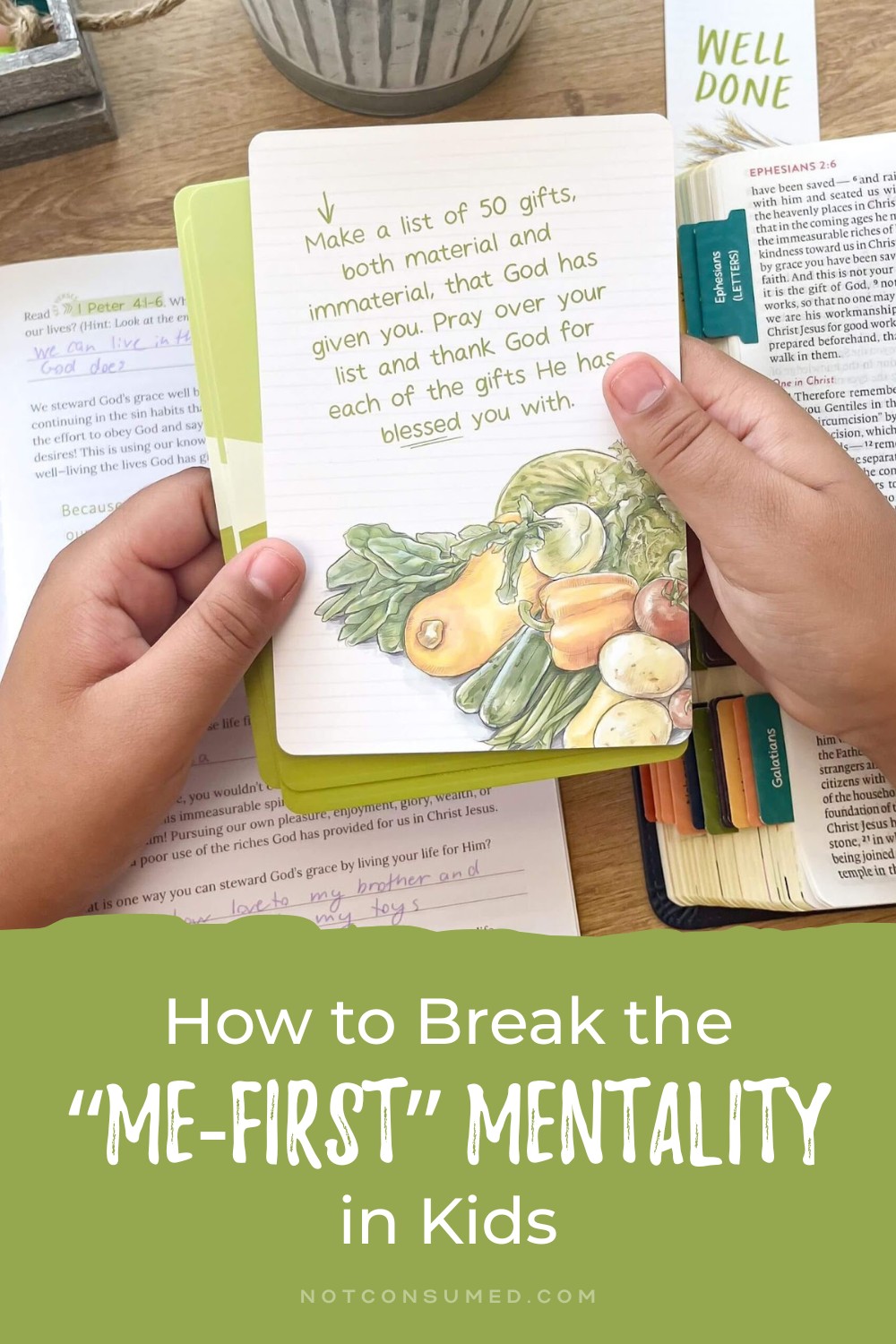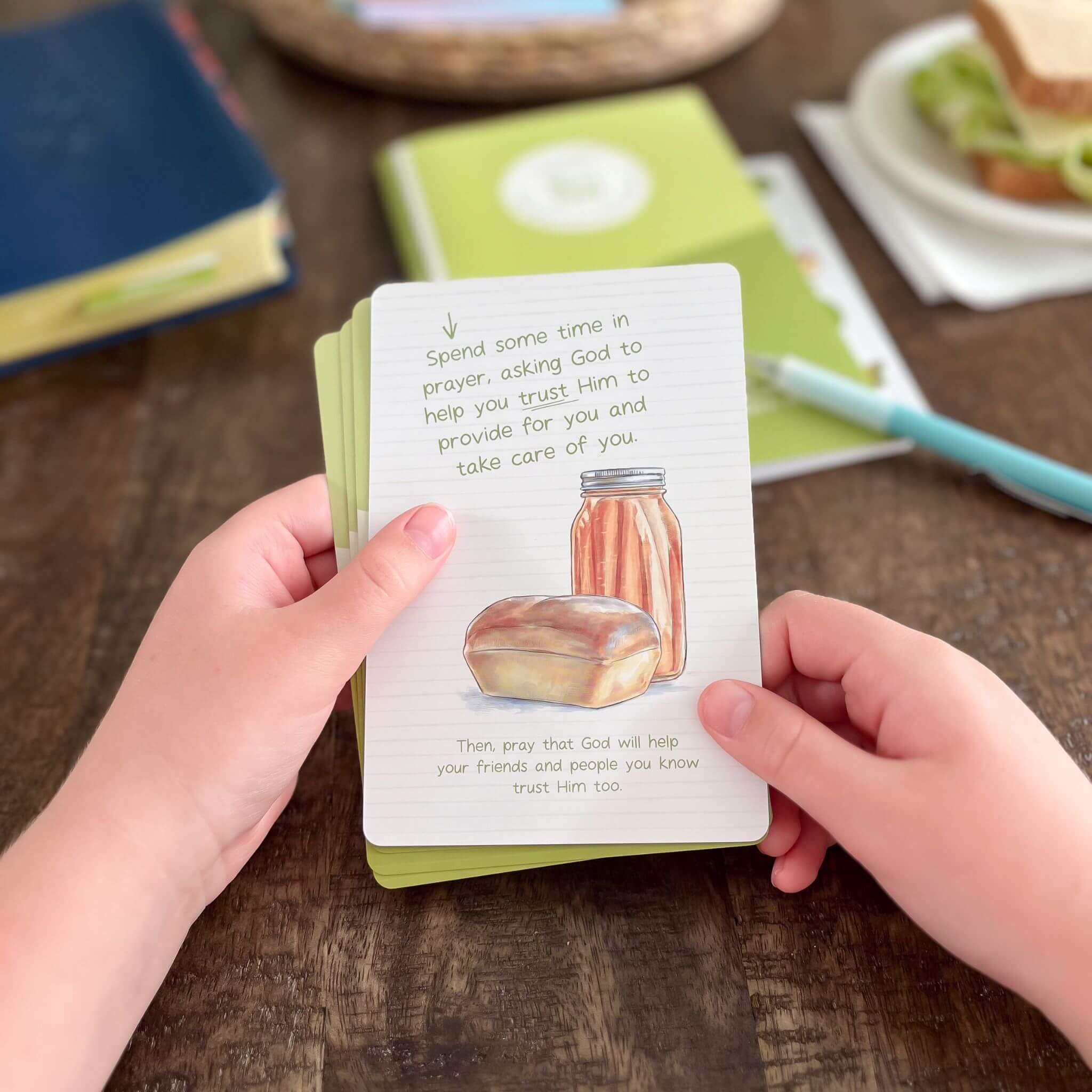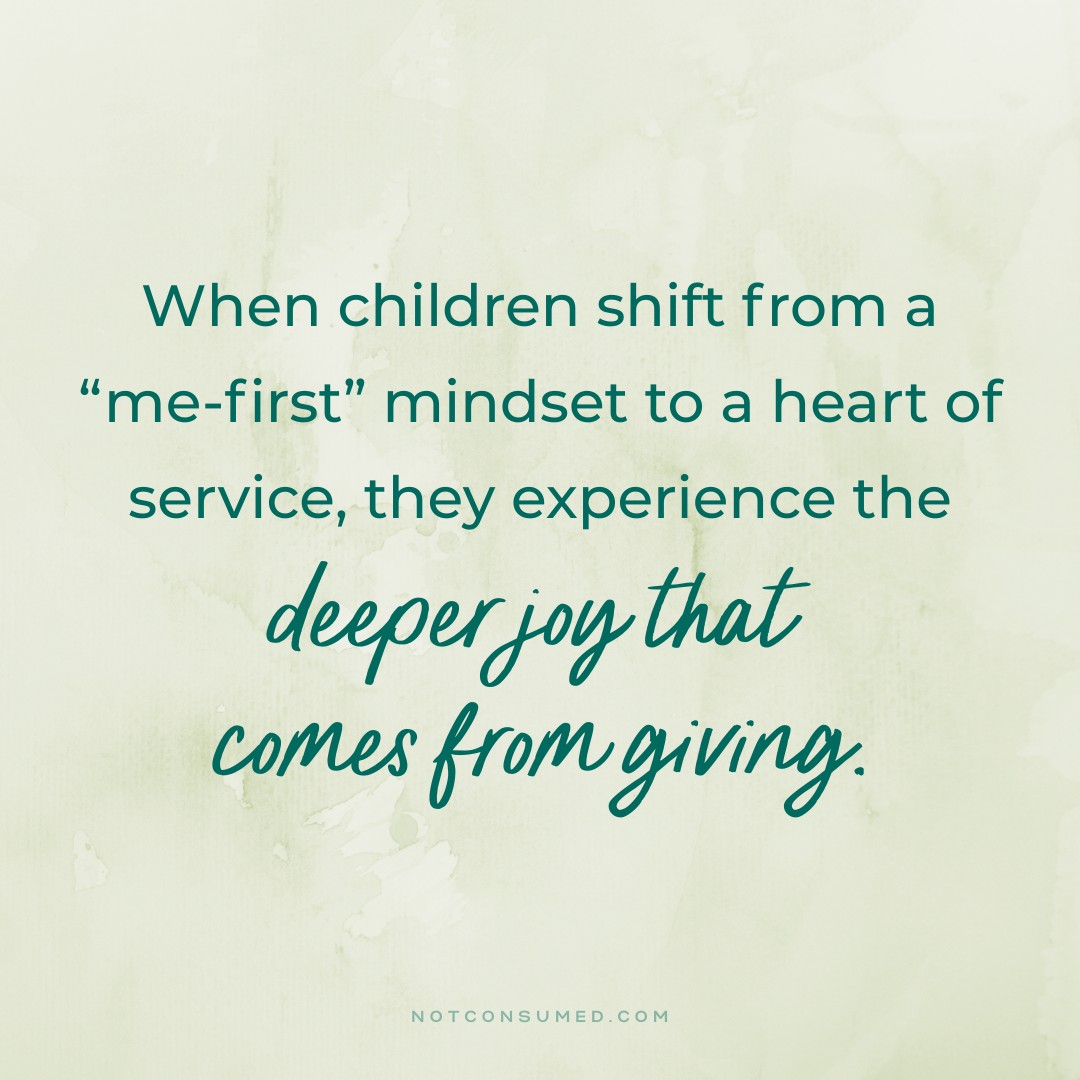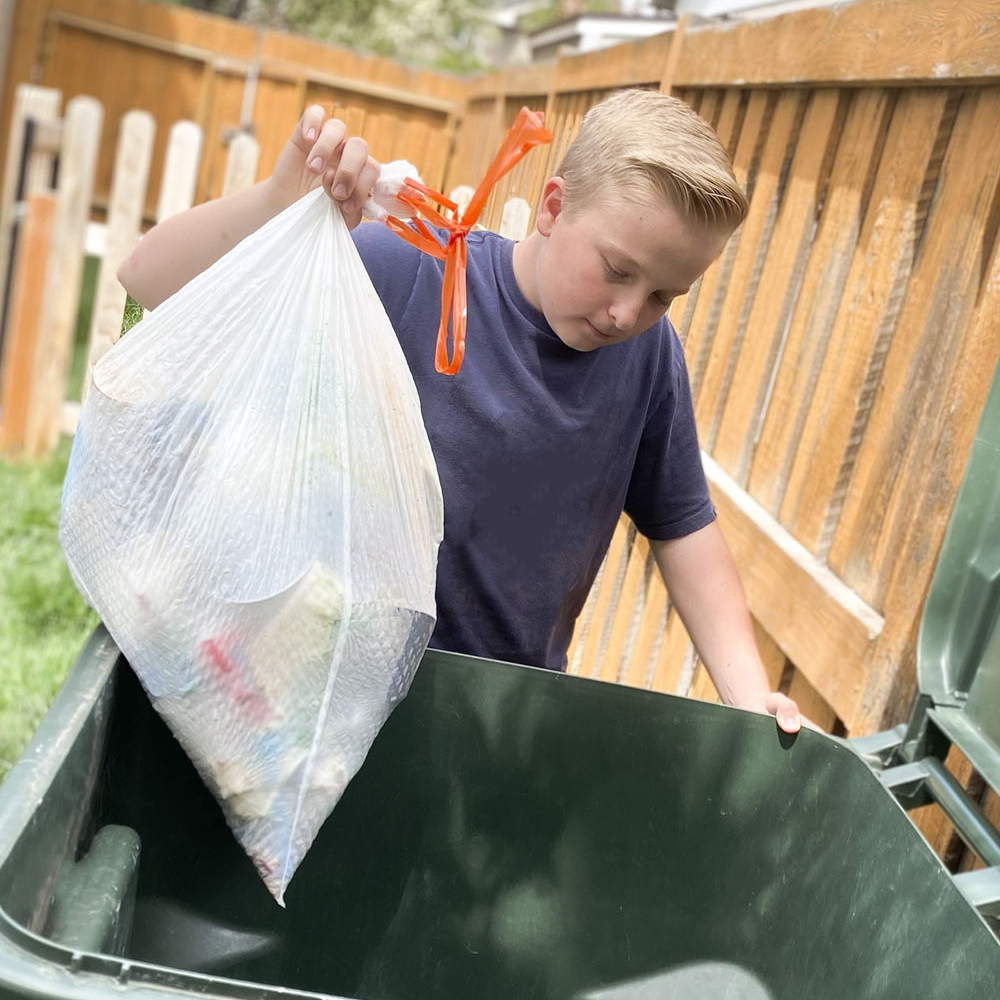Teaching Stewardship in a Self-Centered World: How to Break the “Me-First” Mentality in Kids
Table of Contents
This article explores practical, biblical strategies for teaching stewardship to kids, encouraging them to view their resources not just as personal assets but as tools for blessing others and honoring God.
When I was in middle school, my mom signed me up to be a candy striper at the local nursing home. I did not want to do it.
While my friends spent their summer break at the pool, riding bikes, or sleeping in, I was spending mine playing bingo with elderly residents. At the time, it felt like I was missing out on all the fun. I dreaded those three days a week, grumbling every time we pulled into the parking lot.
Looking back, I realize my attitude wasn’t great that summer. But I also saw something I couldn’t at the time—it was laying a foundation of servanthood in my heart. My mom could have let me stay home, but instead, she encouraged me to step outside my comfort zone and serve. And now? I’m so glad she did.
It’s no secret that kids today, just like I did decades ago, naturally focus on their own wants and needs. Whether it’s the latest toy, more screen time, or the last cookie, their instinct is often “me first.” While this is a normal part of childhood development, it also presents an important opportunity for parents to teach an essential life skill: stewardship.
Stewardship is about more than just handling money; it’s carefully deciding how to use one’s time, talents, and resources. When children learn to see what they have as a gift from God that they can use for good, they shift their mindset from self-centeredness to one of service.
So, how can parents help their kids break free from a “me-first” mentality and embrace a heart of giving and responsibility? It starts with intentional opportunities to serve, just like my mom gave me all those years ago.

Rethinking “Me-First”: Teaching Kids to Steward Their Gifts
Time
How children spend their time reveals their priorities. Are they only focused on themselves—video games, TV, social media—or are they learning to use their time in ways that honor God? Stewarding includes spending time growing in faith, learning new skills, developing their gifts, and building relationships. Encouraging kids to use their time wisely helps them grow in responsibility and purpose.
Practical Ideas Kids Can Implement:
- Make time to read the Bible every day.
- Be a prayer warrior—kids can develop a habit of praying for others and even start a prayer list.
- Help younger children with reading, schoolwork, or learning new skills.
- Write a kind note to a friend.
- Spend time with an elderly neighbor.
- Volunteer at church by greeting, helping in the children’s ministry, or setting up for events.
- Be a good listener and encourager to friends who need support.
Simple habits will teach your kids that their time is a valuable resource meant to be used for God’s glory, not just personal entertainment.

Acts of Kindness
Kids can learn to serve in meaningful ways at home or in their community. These small but thoughtful gestures encourage selflessness and help develop a giving heart. The goal of random acts of kindness is to bless someone freely, with no expectations or ulterior motives.
Practical Ideas Kids Can Implement:
- Make a homemade card for someone who is sick.
- Help a neighbor or parent with yard work.
- Bake treats for a friend or sibling who is having a hard time.
- Practice hospitality by helping host playdates, church events, or family gatherings with a welcoming heart.
- Start a kindness jar and fill it with encouraging notes or acts of service that can be done on a weekly basis.
The joy of giving in this way is truly priceless.
Money
When kids do receive money—whether as a birthday gift, a regular allowance, or a part-time job—it’s important to teach them that every dollar has a purpose. Instead of impulsive spending, they can learn the habit of saving, spending, and giving.
- Save for something meaningful.
- Spend wisely on things they truly enjoy.
- Give to a cause or person in need.
Here are a few practical ideas your kids can implement.
- Offer to babysit or pet-sit for free to help a family in need.
- Save up for a special donation to a missionary, charity, or someone in need.
- Use chore money to buy canned goods or toiletries for a local food pantry.
- Give your child a small monthly budget to manage (even just a few dollars), encouraging them to divide it into giving, saving, and spending categories.
By practicing these principles early on, children develop a lifelong habit of managing money responsibly.
Biblical Foundations of Stewardship
Stewardship is a big word, but the concept is simple: taking care of what God has given us. It is a biblical principle that teaches the importance of responsibility and generosity. Here are a few key scriptures that you can use to help reinforce this lesson.
- Matthew 25:14-30 – The Parable of the Talents: God entrusts us with resources, and it is our responsibility to use them wisely.
- Luke 16:10 – Faithful with little, faithful with much: When children learn to be responsible with small things, they grow into trustworthy adults.
- Proverbs 3:9 – Honor the Lord with your wealth: Stewardship includes giving and honoring God with what we have.
For kids who may struggle with understanding this concept, you can explain that being a steward means we are like “managers” of what God has given us. We don’t own time, money, or talents, but we are trusted to use them wisely. When kids understand that everything they have is a gift from God, they begin to see their role as caretakers rather than owners.
Practical Ways of Teaching Stewardship
Each of my three kids is uniquely gifted. My oldest loves to read and babysit, my middle is passionate about art and animals, and my son thrives in sports. If I asked my middle child to serve by babysitting or my son to teach an art class, they would do it, but not with the same joy and enthusiasm as if they were serving in their natural strengths.

Too often, as parents, we ask our kids to serve with us in areas that we are passionate about without considering where God may be leading them. I realized this years ago when, on a whim, I took my middle daughter to volunteer at an animal shelter for her 9th birthday. I’ll never forget the passion and excitement in her eyes—it was worth every minute of the dog hair and odor I came home with that day. She was in her element, and without any prompting from me, she asked to go back.
What started as a birthday activity turned into a monthly routine of walking dogs together. To this day, at 18 years old, she still finds ways to use animals in the way that she serves. Why? Because she was given the chance to steward her gifts in a way that aligned with how God made her.
When teaching stewardship to kids, it’s important to help them find their place in serving. Not every child will enjoy the same opportunities, but when we help them recognize how they can use their unique gifts for good, they are far more likely to embrace a lifetime of generosity and service.

Many kids think stewardship just means “not wasting” things, but it also means using what we have to help others.
Managing Time Wisely
- Challenge kids to dedicate time to serving others—helping a sibling, volunteering at church, or simply reading the Bible each day.
- Teach them to balance their schedules with fun, responsibilities, and acts of service.
- Encourage them to commit to small, consistent acts of kindness that help others.
Time:
- Me-First: Playing video games all day.
- Good Steward: Helping a sibling with homework or volunteering.
Handling Money with Purpose
- After introducing the save, spend, give model, set up jars or envelopes so kids can begin using this method, learning that money has a purpose beyond personal pleasure.
- Encourage them to tithe at church, donate to a charity, or buy a thoughtful gift for someone in need.
- Let them see where their giving goes—whether it’s packing meals for a food pantry or purchasing Christmas gifts for a child in need. When kids experience the impact of their generosity firsthand, they’re more likely to continue giving.
Money:
- Me-First: Spending all their money on toys and candy.
- Good Steward: Using a Save, Spend, Give model—setting aside some money to help others.
Using Talents for Good
- Help kids identify their skills and find ways to utilize them for the benefit of others (e.g., art, music, sports, writing, baking).
- Teens can teach a younger co-op class, coach a youth sports team, or serve in a children’s ministry.
- Volunteer as a family in ways that allow kids to actively participate.
Talents:
- Me-First: Keeping their artistic or musical skills to themselves.
- Good Steward: Making a card for someone or playing music at church.
Too often, we choose areas of service that feel comfortable for us as adults, but it’s important to find places where our kids can get involved, take ownership, and truly enjoy serving. Kids should feel like they are making a difference, not just tagging along with their parents.

Need additional ideas for teaching stewardship?
- Use musical talent to lead worship at church or bring joy to residents at a local nursing home.
- Share artistic skills by creating encouraging cards or artwork for others.
- Use athletic ability to encourage teamwork, include others in games, or help assist in coaching younger kids.
- Use leadership skills to organize service projects, lead a Bible study, or help at a homeschool co-op.
- Explore passions with purpose (animals, baking, technology, etc.) and find ways to bless others through those interests.
- Tithe or give a portion of their allowance to the church or a ministry they care about.
- Create handmade gifts instead of buying presents to show thoughtfulness and stewardship.
- Spend time visiting or calling grandparents or elderly neighbors who may feel lonely.
- Give up screen time to spend quality time with a sibling or serve in the community.
- Help a new student at co-op or church feel welcomed and included.
- Plan a family “serve day” where everyone gives time and energy to bless others together.
- Set up a “blessing box” in your home where family members can drop off small items, notes, or gifts to give away to someone in need or to brighten a neighbor’s day.
In a world that often values overconsumption and self-recognition over serving others, our Well Done Bible Study invites us to shift our focus. Rooted in the biblical principle of stewardship, this study helps families cultivate a mindset of diligence, responsibility, and selflessness.
Moving from “Me” to “Mission”
I still remember the day my daughter did not want to go. For two years, my girls—then just 6 and 8 years old—had joined me each month as we served at our church’s Senior Luncheon. It was something we did together, a small way to bless the older members of our community. Most of the time, they enjoyed it—handing out plates, chatting with the guests, and sneaking a cookie or two when no one was looking.
But this month was different.
One of them had something else she wanted to do, something that sounded a whole lot more fun than serving lunch to a room full of elderly people. She didn’t understand why she had to go. I didn’t quite take her kicking and screaming, but it was close.
As a parent, it would have been easy to give in, to let her skip just this once. But I knew that if I did, I’d be teaching her that service is optional—that giving our time to others is something we do only when it’s convenient. Instead, I chose to hold the line.
That day, she showed up reluctantly. But something happened as she poured drinks, cleared plates, and listened to the same stories she’d heard a dozen times before. By the time we left, her attitude had shifted completely.
That’s the thing about service—it doesn’t always feel good at first. But when we push through our own preferences and put others first, we start to experience the joy of giving. For kids especially, these small moments of stretching lead to a lifetime of stewardship.
So, how do we help our kids move from a me-first mentality to a mission-minded life? It starts with intentional teaching, consistent modeling, and real-life opportunities to serve—even when they don’t want to.
One of the biggest challenges in breaking the “me-first” mindset is shifting a child’s perspective from personal desires to a greater purpose, which is exactly what happened that day at the senior luncheon.
As parents, when situations like this arise, we need to teach our kids to stop asking “What do I want?”, and instead, encourage them to ask, “How can I serve with what I have?”
Here’s how to make this shift happen:
- Help kids see themselves as part of something bigger—life isn’t just about them.
- Change the conversation. Instead of asking, “What do you want to do today?”, ask, “What is one way you can help someone today?”
- Show them that stewardship isn’t about losing something—it’s about finding purpose in being responsible.
- Celebrate their efforts! Let them know you are proud of them for the work they completed and the time they spent serving.
- Rotate who leads prayer or reads Scripture during family devotions to help each child grow in confidence and spiritual leadership.
- Create a simple “stewardship journal” where your child can reflect weekly on how they used their time, money, or talents to serve, and set a small goal for the week ahead.
Some children naturally resist responsibility, struggle with generosity, or develop a sense of entitlement when things come too easily. Overcoming these challenges starts with small steps—giving them manageable tasks, helping them connect with causes that matter to them, and teaching them the value of effort.
For example, when one of my daughters learned about Locks of Love, an organization that provides wigs to children who have lost their hair due to medical conditions, she decided to grow her hair out and donate it. Knowing her sacrifice would help a child in need made the experience deeply meaningful and rewarding.

When kids experience the impact of their actions, whether by brightening someone’s day, saving for something meaningful, or seeing how their gifts can help others, they begin to develop confidence, gratitude, and a heart for service.
Stewardship is about recognizing that everything we have—our time, money, and talents—is a gift meant to be used with purpose. When children shift from a “me-first” mindset to a heart of service, they experience the deeper joy that comes from giving. By encouraging them to ask, “How can I use what I have to serve others today?” we help them grow into responsible, generous, and mission-minded individuals who make a real and lasting impact in the world.

Misty Bailey has had a passion for writing since childhood. Growing up, she spent hours reading Little House on the Prairie and American Girl books while crafting her own pioneer adventures. Today, she channels her love for storytelling into encouraging and equipping homeschool moms with practical, real-life advice because homeschooling is about growth, not perfection. When she’s not writing or homeschooling, you’ll likely find her strategizing (and hopefully winning) a game of Catan with family and friends, deep in a historical fiction novel, on a date with her hubby, or enjoying time at church.







